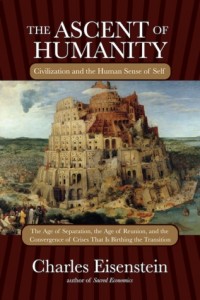As As I was writing Money, Sex, Power, and Faith: The Convergence of Culture, I have been weaving my way through the history of our civilization, somewhat following the path left by Charles Eisenstein in his book The Ascent of Humanity. As I read his article in the Huffington Post called “Sustainable Development: Something New or More of the Same,” I again resonated with how unsustainable our economic model of growth for growth’s sake is, especially when you consider how, ultimately, the vast majority of this perceived wealth that we’re using all of our time, energy, and resources to create is going into the bank accounts of an extremely small percentage of the population while so many more struggle, starve, and suffer. One might say that the financial hierarchy we continue to build is not too different from the Tower of Babel in both its inherent narcissism and structural instability.
There is an aberration in the way that we view our economy as something that needs to grow and grow. We should be seeing it as something that needs to flow and flow. The economy, this mental construct that we’ve created, should not be seen as a way to make money by assuming more debt, but as a means of providing for life to flourish.
In all of nature, where we look at how life happens, we certainly see a season of growth – in humans, in animals, in trees, plants, vegetables, and fruits – everything has a time of growth. And then… all of them stop growing and simply need to be sustained, and this is usually when the fullness of life happens, after the initial growth into an interdependent part of the economy of life.
Humans have grown to love, work, invent, and cultivate. Trees have grown to consistently provide oxygen and sometimes provide fruits. And fruits have grown to be flavorful, beautiful, and nutritious.
And then, they all eventually grow smaller and decompose to become part of something else (except humans because we burn them and lock them in leaden boxes to protect them from returning to nature, but that’s another story).
Unfortunately, the economic narrative that we’ve been following for the last few eons does not include this very important part of the story. Since money isn’t really part of the natural world, but something that humanity fabricated as we built our tower of civilization, it is no surprise that it doesn’t follow the natural model. It is, after all, a creation of mankind, a machine we developed and have pridefully admonished with eternal life beyond the petty responsibilities that we humans have to account for in order to assuage our Creator.
To make our economy sustainable, instead of merely looking to make more money, and increase the debt with which it coincides, we should be looking for as many ways as possible to operate where money is no longer needed. We should grow food to feed people rather than to make a buck. We should administer the highest care for health in order to establish greater well-being instead of managing disease in order to increase profits. And we should develop every product with a cradle-to-cradle methodology, recognizing that waste, garbage, pollution, and trash, like money and its associate, debt, are all distinctly human constructs that should no longer be exhorted as they have been.
There is no “away” to throw things to, and there is nobody on their way to bring another shipment of natural resources once we use all of ours on making disposable products that don’t decompose. Our current economic policy has us drawing extremely valuable, life-giving resources out of the planet so that they can be used once in order for us to play our inventive little game of accounting, and then be useless for the next several generations. A strong economy should not be measured by how much garbage you can grow, but how effectively you can make resources flow.
Order your copy of Money, Sex, Power & Faith today!


